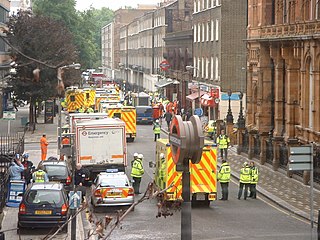
Internet Explorer is a retired series of graphical web browsers developed by Microsoft that were used in the Windows line of operating systems. While IE has been discontinued on most Windows editions, it remains supported on certain editions of Windows, such as Windows 10 LTSB/LTSC. Starting in 1995, it was first released as part of the add-on package Plus! for Windows 95 that year. Later versions were available as free downloads or in-service packs and included in the original equipment manufacturer (OEM) service releases of Windows 95 and later versions of Windows. Microsoft spent over US$100 million per year on Internet Explorer in the late 1990s, with over 1,000 people involved in the project by 1999. New feature development for the browser was discontinued in 2016 and ended support on June 15, 2022 for Windows 10 Semi-Annual Channel (SAC), in favor of its successor, Microsoft Edge.

United Airlines Flight 93 was a domestic scheduled passenger flight that was hijacked by four al-Qaeda terrorists on the morning of September 11, 2001, as part of the September 11 attacks. The hijackers planned to crash the plane into a federal government building in the national capital of Washington, D.C. The mission became a partial failure when the passengers fought back, forcing the terrorists to crash the plane in Somerset County, Pennsylvania, preventing them from reaching al-Qaeda's intended target, but killing everyone on-board the flight. The airliner involved, a Boeing 757-222 with 44 passengers and crew, was flying United Airlines' daily scheduled morning flight from Newark International Airport in New Jersey to San Francisco International Airport in California, making it the only plane hijacked that day not to be a Los Angeles–bound flight.

There are a number of disputes concerning the Church of Scientology's attempts to suppress material critical of Scientology and the organization on the Internet, utilizing various methods – primarily lawsuits and legal threats, as well as front organizations. In late 1994, the organization began using various legal tactics to stop distribution of unpublished documents written by L. Ron Hubbard. The organization has often been accused of barratry through the filing of SLAPP suits. The organization's response is that its litigious nature is solely to protect its copyrighted works and the unpublished status of certain documents.

In the United States, the Homeland Security Advisory System (HSAS) was a color-coded terrorism threat advisory scale created in March 2002 under the Bush administration in response to the September 11 attacks. The different levels triggered specific actions by federal agencies and state and local governments, and they affected the level of security at some airports and other public facilities. It was often called the "terror alert level" by the U.S. media. The system was replaced on April 27, 2011, with a new system called the National Terrorism Advisory System.

"We Are the World" is a charity single originally recorded by the supergroup USA for Africa in 1985. It was written by Michael Jackson and Lionel Richie and produced by Quincy Jones and Michael Omartian for the album We Are the World. With sales in excess of 20 million copies, it is the ninth-best-selling physical single of all time.

AnandTech is an online computer hardware magazine owned by Future plc. It was founded in 1997 by then-14-year-old Anand Lal Shimpi, who served as CEO and editor-in-chief until August 30, 2014, with Ryan Smith replacing him as editor-in-chief. The web site is a source of hardware reviews for off-the-shelf components and exhaustive benchmarking, targeted towards computer building enthusiasts, but later expanded to cover mobile devices such as smartphones and tablets.

The 7 July 2005 London bombings, also referred to as 7/7, were a series of four coordinated suicide attacks carried out by Islamist terrorists that targeted commuters travelling on London's public transport during the morning rush hour.

The 7 July 2005 London bombings were a series of suicide attacks carried out by homegrown terrorists on London's public transport network during the morning rush hour.
Abdul Nacer Benbrika, also known as Abu Bakr, is a convicted criminal, who served a custodial sentence of fifteen years, with a non-parole period of twelve years, for intentionally being the leader and a member of a terrorist organisation. Benbrika was one of 17 men arrested in the Australian cities of Sydney and Melbourne in November 2005, charged with being members of a terrorist organisation and of planning terrorist attacks on targets within Australia. Benbrika is alleged to be the spiritual leader of the group. All 17 men pleaded not guilty. On 15 September 2008 Benbrika was found guilty as charged and subsequently sentenced.
A beheading video is a type of snuff video depicting a live murder in which a hostage or victim is shown to be graphically decapitated, or the head is displayed in the aftermath. Such videos are typically distributed mostly through the Internet, and are often employed by groups seeking to instill shock or terror into a population. Although beheading has been a widely employed public execution method since the ancient Greeks and Romans, videos of this type only began to arise in 2002 with the beheading of Daniel Pearl and the growth of the Internet in the Information Age, which allowed groups to anonymously publish these videos for public consumption. The beheadings shown in these videos are usually not performed in a "classical" method – decapitating a victim quickly with a blow from a sword or axe – but by the relatively slow and torturous process of slicing and sawing the victim's neck, while still alive, with a knife.

The FBI Seeking Terror Information list is the third major "wanted" list to have been created by the United States Department of Justice's Federal Bureau of Investigation to be used as a primary tool for publicly identifying and tracking down suspected terrorists operating against United States nationals at home and abroad. The first preceding list for this purpose was the FBI Ten Most Wanted Fugitives list. In 2001, after the September 11 attacks, that list was supplanted by the FBI Most Wanted Terrorists list, for the purpose of listing fugitives who are specifically wanted for acts of terrorism.
Glen Jenvey is a British man who claims to have infiltrated, undermined and exposed Islamic extremist groups. He also states that he has infiltrated the Tamil Tigers, working for them in London. Jenvey says he used the internet to infiltrate terrorist organizations, and to have developed a relationship with Abu Hamza al-Masri through these means. Recorded film footage with James Ujaama was, he claims, obtained through similar means. Jenvey said that his tapes, in which Hamza called for Jihad, were responsible for Hamza's arrest and trial.

The Jewish Internet Defense Force (JIDF) was an organization active from 2000 that used social media to mobilize support for campaigns against websites and Facebook groups that promote or praise what it described as Islamic terrorism or antisemitism. The group's website described the JIDF as a "private, independent, non-violent protest organization representing a collective of activists". The JIDF's work has been termed "hacktivism" by the BBC and Haaretz. The JIDF Web site was live in February 2014 although with little activity, and is no longer available.

Alfie Dennen is a British creative technologist, Artist, and founder of several prominent websites dedicated to social activism.

The Wayback Machine is a digital archive of the World Wide Web founded by the Internet Archive, an American nonprofit organization based in San Francisco, California. Created in 1996 and launched to the public in 2001, it allows the user to go "back in time" to see how websites looked in the past. Its founders, Brewster Kahle and Bruce Gilliat, developed the Wayback Machine to provide "universal access to all knowledge" by preserving archived copies of defunct web pages.

In May 2005, an unregistered editor posted a hoax article onto Wikipedia about journalist John Seigenthaler. The article falsely stated that Seigenthaler had been a suspect in the assassinations of U.S. President John F. Kennedy and U.S. Attorney General Robert F. Kennedy.

Cloudflare, Inc. is an American company that provides content delivery network services, cloud cybersecurity, DDoS mitigation, and ICANN-accredited domain registration services. Cloudflare's headquarters are in San Francisco, California. According to The Hill, Cloudflare is used by more than 20 percent of the Internet for its web security services, as of 2022.

The al-Aqsa Martyrs' Brigades is a coalition of Palestinian armed groups. The organization has been designated as a terrorist organization by Israel, the European Union, Canada, Japan, New Zealand, and the United States.

PeopleSound was a British audio streaming platform founded on 22 June 1999 by Ernesto Schmitt. Going live in October 1999, it was the first European music streaming platform and the most visited. At peak, it was amongst the top ten most visited entertainment websites in Europe, with millions of registered users, and one of the highest profile new-age internet startups.















